That is an excellent point. Why is Bologna such a memorable event, a strong mark in the history of post-war Italy and a turning point in the political self-understanding of the country – and the Oktoberfestattentat is something like folkloristic, something weird and Bavarian, no context, no narrative that puts the event into a perspective. It was quickly diminished in size and relevance. How could this happen? Everything was there to produce a scandal of sorts. Pictures, dead, a more than popular site. It was a bit like tearing out the heart of Munich. But things were settled fast. This was a political decision by the Strauß government. But why did it work? How did the early-eighties iconographic memory work or not work? As Alexine says, maybe size does matter, for a model, for the dead. 85 versus 13. 85 versus 13. 85 versus 13. Or is there just no narrative for right-wing terror? Just like there is no narrative for right-wing thinking. This is, by the way, what made the other deadly series of right-wing murders possible, the terror trio of the NSU. You need a story to find what you are looking for. This is a paradox. This is politics. How could it happen?
My first thoughts on bombs and bombers as ‘loners’ go straight to Karin Grech. She died when a letter was delivered by a fingerless carpenter to her doorstep some days after boxing day in ’77.

Why? I don’t know. How relevant this is to this conversation? I also don’t know. But it makes me question the relevence or contribution a reenactment of the oktoberfest attentat could have. I ask simply what? why? and how?
We start with a model of the situation. What is it made of? What does it say? Will the meaning change with scale? Generally speaking, it is easy to fetishize a situation when it is represented in a tiny scale, (think dolls houses and train sets?). It is also however, hard to fall in love with such a bloody event. What do we do with the 47 cigarettes? Do we shed light on other details linked to the scene but conveniently forgotten?
Working with models is usually simple and straightforward if you know your tools, your material, your glue. Here the game changes. The whole point should be the change. From the whole to the fragmented parts – parts which represent an exploded place/victims/story/past… What do we represent? How specific will it be? Maybe it is enough to start, explode, record and repeat. Maybe it’s good enough. For now…
Here, in Venice there is no sign of the oktoberfest attentat in 1980 events that shaped architectural discourse. How strange. Maybe it was outnumbered by the Bologna blast. Maybe because simply 85 is bigger than 13. Maybe size does matter in the end.
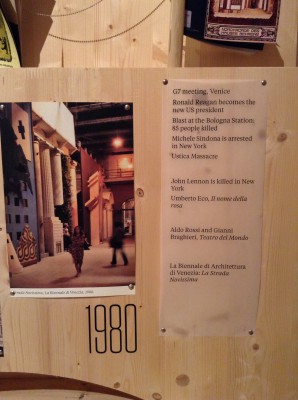
radical pedagogies by beatriz colomina (venice biennale ’14)
Is it really such a difference, love in the times of Twitter and Tindr and the old-fashioned love of a wife sitting in a hut in Russia waiting for news from the Gulag, a young man idling on a bench in Venice waiting for the letter she has sent him, a girl missing the boy who was sent off to boarding school, two lovers torn apart by two continents, a husband longing for this girl, a wife thinking of another man – does it really change the substance of the eternal conceit that love is, namely that to feel something is better than to feel nothing? This is what it means to be in the world, internet or pre-internet. It is about the consciousness of being here and there, not physically, but in your mind, some would say in your heart. It is a proof of things that are otherwise very difficult to take for granted. The sun will rise, the sun will set. The rain will fall, the rain will stop. There will be another day or there might not be one more. Age is a sequence of days, weeks, months and years, and to give a life a meaning there has to be a story with a few characters and a plot. Otherwise all is empty. All is wrong. All is lost. So the other as the missing half? Maybe the other as the missing world. As this universal hole that is at the heart of things. If love brings no relief, it is not our fault. If love goes wrong, it is not our fault. If love is an illusion, make a pop song out of it. Love is not the thing that saves you. Love is not the thing that kills you. Love is beautiful, don*t get me wrong. Love is necessary, just for all of these reasons. Love is a test of time. Love is the dream that we want others to dream. Love is, after all, about oneself. And it cannot be any other way. We don*t even know what that means in the light of the doubts that have been cast on the very notion of the self in the last 200 years. Stil, it is love that moves us, that creates something that is absurd in the face of everything that is around is, a moment maybe of truth, an intimacy that really has been gone, from the beginning, in a way the story of Adam and Eve is cute in that sense. But this is what children would tell each other, the story with the apple. There can be no God which is a force of love. Not even another human really can be this source of love. Mind you, again, this is not bad news. It it just a glimpse of the strange and beautiful ways of this grim universe. This is what love is.
You touch on many interesting points – and I’m not sure I have many satisfactory answers. But here’s how I see it from this side of the channel. I agree with you that 2014/15 is shaping up to be very important season. But then again, what season hasn’t been truly important, in one way or the other, in recent history? 2007 marked the beginning of big names at Bayern (Toni, Ribéry), then there was Jürgen Klinsmann, then van Gaal, Heynckes… and now: Pep 2.0. The unresolved issues surrounding the club’s leadership aside, there’s essentially one over-riding question: Will Bayern win the Champions League? I think that’s the only trophy that really matters. Guardiola had a shot at it last season and missed badly. This will be his second attempt. There’ll be a third one – either way – but I don’t believe he’ll stick around beyond 2016. That basically amounts to a two-year window of opportunity, for this team, and this coach. Bayern will remain competitive beyond his stay but it’ll be a different side, with the likes of Schweinsteiger, Robben, Ribéry and maybe Lahm, too, losing ground to different, younger players. Guardiola can either win the Champions League – or fail. And if he fails again, it’s a matter of how he fails. The Real Madrid tie plunged the club into a short but sharp crisis of confidence. Guardiola felt misunderstood. Some of that carried over in the summer, I think, when he was offered Sami Khedira by the board after losing one of his favourite players in Toni Kroos but by and large, things are pretty calm now. It will stay like that, until crunch time comes in early spring. As far as the Spanish transfers are concerned, I don’t see them as part of a wider strategy. Guardiola felt that there would be a problem in midfield, for at least the first half of the season, and Xabi Alonso presented an obvious solution. He’s there to do a job, in the absence of others. It’s stop-gap signing. And a very, very good one, at that.
On the one hand, the events of September 1980 are well documented. There was a TV feature just yesterday, it was thorough and critical and asked the right questions. What can art do in this context? What is the story we want to tell? What are the connections we want to make? There is, of course, the very nature of fact, the documentation via photos, via witnesses which might or might not generate a true feeling or an insight into what has happened. Was this what the TV feature did? There is the little horror of authenticity that Franz Josef Strauß always elicits. There is the Wehrsportgruppe Hoffmann. But is there also a different truth? What can we do about this event? One thing I asked myself is: Should we build this modell of the site, of the event? Should we blow it up? And: What does reenactment mean in this context? We did the Pope assassination attempt, this was quite different. What happens if we reenact this event where so many people died? Or does it fit even more into the violent story of these years, the very essence maybe of these years, where assassinations all over the world shocked and up-rooted whole societies, maybe most of all in San Salvador with the bloody civil-war. But also Bologna etc. What is the context of what we see in Munich? Is it only the FJS nostalgia? We will cater to that, we will have the fine silk scarf that Florian Böhm printed. It shows Strauß hunting in Pakistan. What is the connection here? The problem with news is that they show you what you see. They don*t show you what you do not see. This might seem obvious, but it is in fact a ver profound problem with tremendous political consequences. News should be about showing you the things you do not see. This again is a simple technical problem: You cannot see what you cannot see. So how will we resolve this problem? Is it even a problem?

My sex life started when I was three years old. I don’t know how it happened the first time nor remember why I did it. But at that time, I started dry-humping my pillow. All the time. The sensation was even better when I wanted to pee. Later, I would just dry-hump almost anything. Beds, couches, folded blankets, pillows, table corners, I would even try with my mum’s leg but she didn’t allow me. When my parents noticed this behavior, they got kind of worried because it was getting worse and worse as time passed. I wouldn’t stop. I’d just do it more and more as days went by. So they decided to take me to a loonie-kids doctor. They tried to find out if I was ever abused by someone in my family. But I wasn’t. Not that I could remember and I remember stuff from when I was two. After lots of questions I didn’t get to see if any of my family members weren’t as nice as they seemed or were maybe a little bit too nice to me, the shrink suggested my parents to do a psycho-diagnosis, which never happened, because my parents couldn’t afford it. So, mystery solved? More like a cold case.
After it was decided that they weren’t going to find the cause of my “problem”, they decided it was best to let me know at my short age that what I was doing was weird and wrong. They were really nice about it, though, but that would make me to try and repress that part of myself that gave me oh such joy. So I started hiding like an embarrassed 12-year-old boy who is caught masturbating by his mum. So sad. Like a husband that promises to quit smoking to his wife, I didn’t quit my habit at all, but still got caught quite constantly because I wasn’t a suburban husband going for his cigs’ secret spot in the backyard, but instead I was a little girl dry-humping her pillow, or any couch if I was left alone (and, off the record: maybe even my cat). There was a game my grandparents used to do and my aunt too, which consisted in sitting me on their laps looking at them and singing about riding a horse to Bethlehem and grabbing my hands to mimic the movement your hands make when riding a horse that said: “Ico Ico, little horse, let’s go to Bethlehem, for today’s there’s party and tomorrow too” (it rhymes in Spanish). Very Catholic, now that I think about it. In one of those times I remember trying to dry-hump my grandpa’s leg but he noticed something weird was going on and just put me down and wouldn’t allow me to do it. I once told my mum I kept doing it and that I didn’t care because it felt good and told her that I also tried to do it on my grandpa’s lap. She felt really really nervous for a second but kept calm and asked me if my grandpa let me do it. I told her what happened, that he wouldn’t let me. She felt relief. I felt embarrassed for a while for trying that on my grandpa.
My mum also consulted my pediatrician, who at the time was the head of pediatrics at the Deutsche Hospital and he asked me several questions and asked me if I did it when I felt like going to the bathroom. I told him it was more intense in those occasions and he told my mum it probably just was like a reaction to that, or something like that.
Anyway, as most suburban husbands that never quit smoking whether their wives acknowledge it or not, I never really fully quit my dry-humping whether my parents acknowledged it or not (and believe me, as 99,9% of suburban wives they represent in this story, they did). I just got into other new and improved stuff by the time I was 5-6 years old: using my hand (under my panties!). A whole new horizon ahead of me… I thought I was discovering the brave new world. Turned out it’s something everybody in their right minds do.
What an ending. It made me smile. And shortly after I thought: Is our conversation now heading towards universal, romantic Love for the world? Phew. We are neither often lovers nor often in this world nowadays, I´m afraid. We are always here and somewhere else at the same time. Our current habits of digital communication and thus a whole communication industry only show that human beings almost cannot bear to be at one place at a time anymore, with one person at a time, experiencing only one moment or event at a time. We are not being sold contracts for phones anymore, we are being sold pseudo-sensual “connections“ to the ones we care about, to events we love – because we are in the world when we love things? Thumb-up-Love called „Likes” on Facebook? To be a lover in such an abstract sense, as beautiful as it sounds at first, bears the danger to turn us all into 24-hours-enthusiasts – though enthusiast I actually often love. And yet I wonder: Are we really capable of being lovers in your definition, meaning Lover = To be in the World? Why are we so easily leaving the world we are in, as if we had nothing valuable to lose? And now I am returning to your first rather love-deconstructing thoughts. Back to that love-projecting activities people call love, the kind of love that you talked about when we started. Those people that on the surface seem to be unhappy due to love. Or are they unhappy due to a lack of self? This absence of the Self can so easily and effortlessly be changed the moment one falls in love. Falling in love to many means projecting completion into someone else. It was like that from our very first myths and explanations we told each other about love: This half that we are missing. It was always a pitiful narrative: I am missing my half and the other one is missing his half. Two sad halves are wandering round that flat planet called earth. All of this never contained the thoughts: I wonder if the other half is unhappy without me. The perspective was always that two individuals cut in half worried about their unhappiness. As if we are always concerned about ourselves and our completion when we think about Love: Me and my need to become what I was meant to be. Me and my need to feel what I desire to feel. To become what I want to be. Then we meet someone who provides us with enough distance so we can project all this longing onto him/her. We grow into that relationship, into that imagined completion, we grow into who we think we can become. And as soon as we are there, another longing pops up, another desire of what we want to be drives us. We do not grow complete through love, we grow incomplete in another way. I think Love has always been – and nowaday even more so – a vehicle of personal growth to many. A vehicle for the ideology of personal growth. That person is not who I thought he/she would be. Which means: She doesn´t make me feel the way I wanted to feel. And then? Is that question the beginning of real love or the unmasking of unreal love/self-search? The abstract term „lover“, as you defined it, loses its universality the moment it refers to a specific „lover“. It focuses, narrows down. And even if it doesn´t, what happens to us if we really feel completed next to someone? Is that the moment we start being possessive? Fearful? Creatures afraid of loss and abandonment? What if I simply don´t want to lose is that sense of Self I acquired through the Other? Possession? Can we talk about love without talking possession – in a double sense? Ownership and the mental state? Do we really want to posses the other or rather what we think we can be in relation to that other?
So this is the setting. The Oktoberfest at night, the exit with the arching sign overhead, a mass of people. The question is: What to do with it, artistically, politically, intellectually. The politicians decided very quickly what to do: They buried the case. They suggested leftist terrorists behind the plot for a short while and then, as right-wing connections became more evident, they shut the case claiming that it was the lone Köhler who commited this atrocity. It would have been too much to bear to have a right-wing conspiracy, escpecially in Bavaria, where things are always better than in the rest of the republic. But the fact remains, the dead remain, they even, as dead often do, resurface. There are new investigations into this crime, there is evidence of a cover-up, there are piles of testimonials that have never been read, there are, and this is what stayed with me most, 47 cigarettes that were found in the car of Köhler, from six different brands, with and without filters. It seems not very likely that Köhler smoked them all himself, six different brands, with and without filters. It points to the fact that he might very likely not have acted alone. And today it would be easy to look for DNA on the cigarettes that would help identify anybody in the car with Köhler. 47 cigarettes. What to do with them? Artistically, it might be a good idea to smoke them with the audience at Lothringerstraße 13, the art space where we are invited to to a presentation on the subject on October 6. Politically or at least police-wise, the answer was: Destroy them. They had been stored to a while together with other evidence, among other things a hand that had been torn off at the blast and was never claimed by any victim and could also not be identified to any victim. All was discarded a few years back. So no evidence in this direction. But like with all catastrophes, the imagination is larger than any evidence. The interesting thing is: I am not sure how present the Attentat is still in Munich memory, in the memory of the place, in the body of the city so to speak.
Christopher and I did this research concerning the years 1980 and 1981 as important years of a shift overlooked by most historians, tendencies that were still in the stage of latency or out in the open but overlooked: end of Communism, end of Capitalism, haha, well, sort of, more like the beginning of radical Capitalism, the rise of radical Islam. And there were other, smaller stories. Like Bologna, where everybody thought the bomb had been planted by left-wing terrorists and where the police and the politicians acted accordingly. A lie maybe more than a truth generates something that in turn becomes undeniably a fact, a truth so to speak. The assassination attempt on Pope John Paul II was such a case where the myth of him being saved by the virgin Mary became so strong that it made him change his policy towards the Soviet Union. Christopher and I restaged and reenacted this event many times, in Zurich, Hamburg, New Delhi among other places. It was always something not quite cathartic, something fun and relieving and at the same time a bit humbling, serious. Like world history turned into a birthday party for an eight-year-old. This is what we want to do with the Oktoberfest Attentat. Sometimes there seems to be an act of exorcism in our work. Not in this case though. It is more about waking up the ghosts.

September 26, 1980 – in Munich a bomb deposited in a trashcan at the entrance to the Oktoberfest kills 13 people and injures 219, many of whom lose limbs in the explosion. The bomb detonates at 10:20 p.m., just as thousands of visitors are crowding toward the exit. It is beyond dispute that Gundolf Köhler, a university student from the Swabian town of Donaueschingen, made the bomb, took it to Munich and deposited it at the scene of the crime. He is killed, because the bomb goes off too soon.

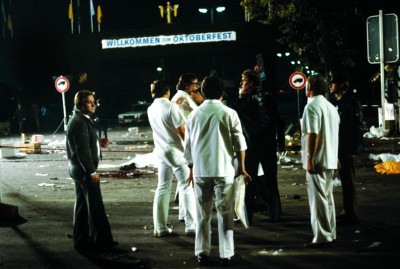
But even 30 years later his motives will remain unclear. Was he a crazy perpetrator who was acting alone, or did an extremist right-wing group stage a terrorist attack against Germany just nine days before parliamentary elections? The student had ties to Wehrsportgruppe Hoffmann, a neo-Nazi organization banned on January 30, 1980. Köhler had taken part in their exercises. Is it really a coincidence that Frank Lauterjung is at the scene of the crime? The key witness to the attack is also a right-wing extremist and he might have been also an informant for Germany’s domestic intelligence agency. Lauterjung survives the explosion, even though only a few meters away, because he has a “bad feeling” and throws himself to the ground before the bomb detonates. Investigators questioned Lauterjung at least five times. He will die of heart failure in 1982, when only 38. Lauterjung tells investigators that he noticed Köhler in a loud discussion with two men in green parkas near the site of the crime, about 30 minutes before the explosion. The two men were not among the victims. What the investigators overlook is that Lauterjung is an avowed right-wing extremist. Previously unknown letters, discovered as part of a deceased person’s estate, will reveal that in the mid-1960s Lauterjung was in the Bund Heimattreuer Jugend (BHJ), where he served as ‘deputy national leader’ and ‘regional commander.’ Members write ‘Heil Dir!’ as reference to the ‘Heil Hitler.’ A BHJ leader suspected that Lauterjung had infiltrated the organization, and that he was possibly working for Germany’s intelligence. He would sometimes “disappear for four weeks at a time, as if he had been wiped off the face of the earth.”
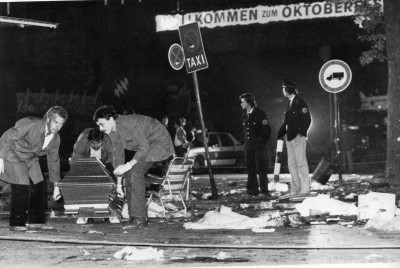
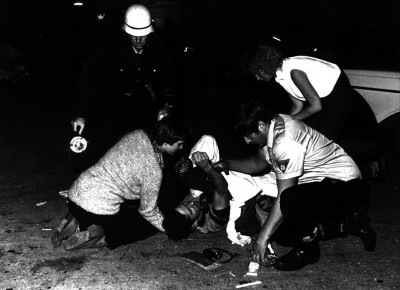
Shortly after he was kicked out of the BHJ, Lauterjung joined the Socialist German Student Union (SDS). Was he following Köhler? Lauterjung claims that, as a gay man, he was looking for sex at a public toilet at the entrance to the Oktoberfest. Lauterjung also says that he believed Köhler was doing the same thing. According to Lauterjung, Köhler was carrying a heavy, cylindrical object in a white plastic bag and a small suitcase. The suitcase disappears without a trace, even though other witnesses say that they have seen it immediately after the bombing. A female passerby says, two young men were standing next to Köhler’s body, shouting: “I didn’t want it! It’s not my fault! Just kill me!” Another woman says that she saw a car with five passengers near the entrance to the Oktoberfest a week ago, just after it was opened. There was a large object wrapped in black material on the back seat. The woman even remembered the license plate: VS-DD 500, a Ford owned by Köhler’s father.


Not even a trace of the detonating device is found among the pieces at the site. The investigators assume that a faulty fuse had caused the early detonation.
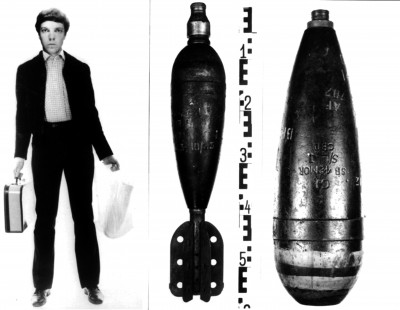
In a 1984 novel, Wehrsportgruppe founder Karl-Heinz Hoffmann will write that the Oktoberfest bomb was detonated by remote control. Are the backers even from Italy? A few weeks before the Oktoberfest bombing, right-wing extremists killed 85 people in Bologna train station. Munich papers receive calls claiming responsibility from “right-wingers in Bologna.”


It’s a way of seeing. I recall what you said about the American Apparel Ad, the staging of men in position usually occupied by women, its seeming unworkability – which arises from the strangeness of seeing men occupy a position that is not theirs, so to speak. This and in a way what you say of Gambia is a reason I detest a certain kind of “feminist,” whose notion of liberation means women positioning men in ways long occupied by women.
That is to say, the legitimization (by women) of women as bitches. In response to the deliberate invisibility of the female gaze, yes, I do think that male and female erotic responses to visual stimuli are culturally conditioned. What you say about your mother and her friends reminds me of a story my mother told me some time ago: The first time she set eyes on my father’s village champion wrestler. (My mother is from the coast, so the concept of half-naked men engaged in wrestling was alien to her.) She was twenty and newly-married. What a sight he cut: His loin-cloth barely covering his heavy buttocks, and the women of the village chanting praises a safe distance behind.
So, yes, I think Kinsey’s female non-erotic response to visual stimuli is not biological. I want to pursue Gambia a bit further. To challenge my preconception, if I accept prostitution as an act of violence a woman commits against herself for material gain, am I merely reconfirming a mindset? Do I see male prostitutes in this light? Is male prostitution also an irreparable damage, an irreversible destruction of a human body? Are male and female commercial sex the same thing? I think it’s safe to say that with both male and female prostitution, men and women are both mauled by the reduction of sexuality and sexual fulfillment to having as many orgasms as often as possible.
Part of the thrill of commercial sex, at least for men who use the services of female prostitutes, is the power play. Is there, I wonder, a transfer of power to these women who go to Gambia during the sexual encounter? This takes me back to Milbrath’s photos and how men and women are sexually positioned: Is it about what could be done to this male body, or what this body could do to them – for these pleasure-seeking European women? In what way does the fact that, historically, men have held a sexual dominance affect our perception of male prostitutes? Is not our general perception of men in society one of power, domination?
Do we ever look at these Gambian males as being exploited by the European women – because of their material circumstances – the same way we’d look if they were female? I find it really interesting, your experience in Gambia, your use of market terminology. In a market driven society, form is usually passed off as content. Since naked cash is the sole nexus between individuals, what common ground could exist between men and women except as buyers and sellers? Again, on the legitimization by women of themselves as bitches. Does the availability of commercial male bodies – in strip clubs and the Gambia – signify the arrival of equality, liberation?
I can understand why the male strip club did not work for you, the same way commercial male sex did not. Neither signified liberation, but rather a buying into ugly reality. They do not in any way challenge our reality. I do wonder, however, to reference the Völkerschauen, if a modified version of it is enacted on the beaches of Gambia and Mombassa. It seems to me, these sex tourists who come to the Gambia are more comfortable with black males they can lead around with an invisible leash and make to perform. (I find what you say about the Völkerschauen really interesting.) It is possible to agree with Freud – in reference to your comments about the cliche of the female need to shroud herself with darkness, her need to hide her desire – that every sexual act is “a process in which four persons are involved.”
One can extend this to also include the preconceptions about ourselves and each other both sexes bring to the act. The one responds to the other – during the act – not truthfully, but according to his/her own externally-imposed preconception. Identity is constructed from birth. It is safe to say that, distance tend to develop between women and their body. This distance is culturally constructed. In a way, I think this is expressed by the myth of Immaculate Conception: the construction of female sexuality in reproductive terms – to exclude the vagina and clitoris.
A woman, what is she? A womb, an ovary. As an aside, I’m thinking of Jamie McCartney’s The Great Wall of Vagina. To what extent does it speak to female shame to never go down there?
It is possible that to the traditionalist-minded, McCartney’s images (so unlike the astonishing leveling out of uniqueness in porn’s designer vaginas), from the most intimate world of women, which had always remained hidden from the eyes of women themselves is an excursion to the dark side of art. A person can either submit to this imposed identity, or seek to reconstruct herself on her own terms, to resist all attacks against her sense of self. (It must be said, however, that easy access to male flesh – on ‘female terms’ – and the staging of the male body does not in anyway constitute resistance to attacks against self.)
With Milbrath, there’s no attempt to go beyond the surface, to look beyond stereotype. There’s, in this gaze, no questioning. My reality of being male is not validated by mainstream imaginings of men. I’d managed to hang on to my own sense of self all through the crisis of adolescence and the pressures to conform. It is for this reason I make my male protagonists deliberately feminine. (The most powerful men are men who are not afraid to be feminine. Machismo is cover for insecurity.) I’d translated my discontent into new images with which I seek to undermine conventional perceptions of black male sexuality. For me, it’s not just the sex. I particularly like the shared silence, the talking, and the taking breaks, the nonsexual caresses.
I like that it is not just the sex. The commodification of love expresses itself in the fetishization of sex, that is, sex stripped of its human quality, stripped of tenderness. To accept this is to accommodate oneself to a life without beauty.